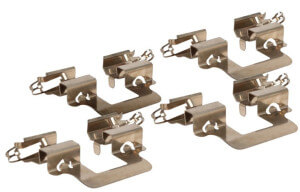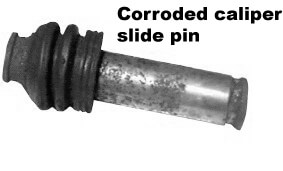Grinding brakes – diagnose and fix
How to diagnose and fix grinding brakes
What causes grinding brakes noise?
Any brake noise, whether it’s a brake squeal, brake chirp, or grinding brakes is caused by vibration between the brake pad and rotor that’s amplified by the other brake components. Auto brake systems incorporate certain vibration dampening components to reduce brake noise, yet still allow brake pads to move slightly. When those parts become worn, corroded, or seized, they allow normal brake vibrations to become annoying.
Brake pad shims dampen vibration
Brake pad shims are designed to dampen the transmission of 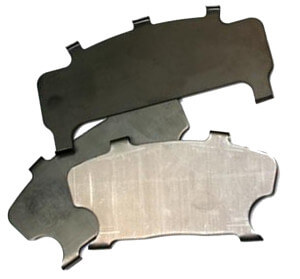 vibration between the steel brake pad backing plates and the caliper. Some brake pads shims are made from soft metal like aluminum, while high-end brake pads shims are made with multiple layers consisting of soft metals and a rubber-like middle section.
vibration between the steel brake pad backing plates and the caliper. Some brake pads shims are made from soft metal like aluminum, while high-end brake pads shims are made with multiple layers consisting of soft metals and a rubber-like middle section.
In addition to the shim, many car makers recommend applying a light coat of molybdenum grease to the back of the brake pad shim to further dampen vibration transmission between the shim and the caliper.
Abutment and anti-rattle clips dampen vibration
The brake pad must move slightly as the pads wear, so they’re often held in
place with stainless steel spring clips. The clips allow movement, while the spring acts as a vibration dampening device. Over time, the stainless steel clips can rust and seize the brake pad, causing grinding brakes, squeal and rumbling sounds. In addition, the heat generated during brakes can remove some of the temper in the metal clips, causing them to lose spring tension which allows the brake pad to vibrate, again causing grinding brakes, brake squeal and rumbling sounds.
Caliper pin grease dampens vibration
The brake caliper moves slightly during each brake application and release
cycle. The caliper slides along greased caliper slide pins and a high temperature brake grease. The caliper pin and grease are protected from the elements by rubber boots. However, when the boots age and crack, they allow road debris, water and salt to wash off the grease and corrode the caliper pins and bores.
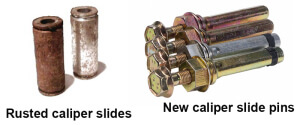
Replace corroded caliper guide/slide pins with new parts. Lubricate with high temp synthetic brake grease
Once a caliper pin corrodes, the caliper can no longer slide freely, causing it to apply brake force unevenly. Uneven brake force causes one brake pad or one section of the brake pad to apply more force, causing grinding brakes noise, squeal and rumbling sounds.
Rough rotor surface can cause grinding brakes noise
Brakes pads stop your vehicle by applying pressure to both sides of a spinning brake rotor. If the pads apply equal pressure, the brake rotor will wear properly. However, if you drive in dusty dirty conditions, road grit can cause the brake rotors to wear deep gouges into the braking surfaces. If the caliper pins and abutment clips have been compromised and the brake pads apply unevenly, the excessive vibration can cause the rotor face to develop an irregular surface that produces uneven braking, causing grinding brakes noise.
How to fix grinding brakes
Start with a full brake inspection. If the pads still have lots of friction material left, but caused a grinding brakes noise, chances are you’ve got a problem with the caliper pins, shims or abutment/anti-rattle clips.
Remove the brake caliper and check the condition of the caliper pins and protective boots. If the boots are compromised, they must be replaced. If the caliper pins are corroded or binding in the bores, they must be replaced.
Next, check the condition of the abutment and anti-rattle clips. If they are rusted,
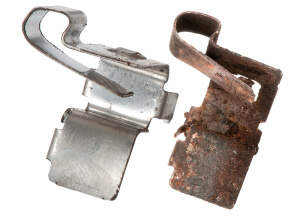
High heat degrades the spring tension of the anti-rattle clips and rust can cause the brake pad “ears” to bind
they must be replaced.
Make sure you remove all rust from the brake pad slide areas and coat those areas with a very light coat of high temperature synthetic brake grease to prevent future rusting. Then install new abutment/anti-rattle clips and apply a very light coat of brake grease to those slides. Next, install new caliper pins and boots, coating the pins with grease. Install new noise reduction shims and apply a light coat of molybdenum grease to all areas of the shims that contact the caliper. Then re-assemble the brakes and test. If the grinding brakes noise is gone, you’ve solved the problem. If the grinding brakes noise is still present, either have the rotors machined or replace with new rotors.
©, 2016 Rick Muscoplat
Posted on by Rick Muscoplat
